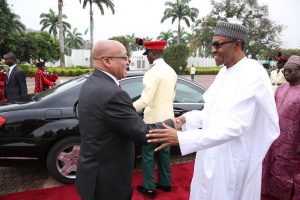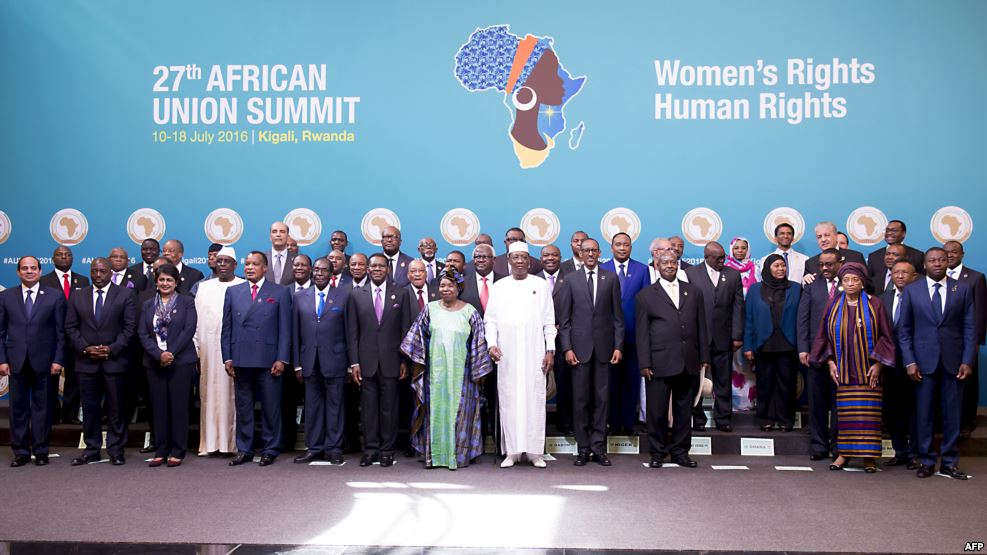By Max Bearak

The parliament was burned in post-election protests in Libreville, Gabon, last month. (Reuters/Edward McAllister)

Presidents Jacob Zuma and Buhari of South Africa and Nigeria respectively, the two leading economic powers on the continent.
The Ibrahim Index of African Governance (IIAG) — the most comprehensive survey of its kind — celebrated its 10th anniversary on Monday with the release of a report that chronicles just how little improvement most African nations can claim in the past decade on a broad set of governance criteria.
The index ranks countries based on those criteria, and the report analyzes how the effectiveness, or lack of it, on one measure, such as rule of law, might affect another, such as free elections.
The 10-year report offers a stark picture of African stagnation, which it links most closely with an almost continent wide deterioration in the “Safety & Rule of Law” index category. The few nations that have seen marked governance improvements and rank toward the top of the list tend to be those with small populations, and are often islands. Mauritius, Seychelles, Namibia, Botswana and Cape Verde score well, for instance, while African economic powerhouses like Ghana and South Africa have seen their scores drop across the board. Countries such as Somalia, South Sudan, Libya and Burundi, which have suffered sustained or new conflict in the past decade, rank near the bottom on similar surveys worldwide.
The cumulative index for Africa at large, scoring for overall governance, went up by one “point” over the past 10 years. Almost half of Africa’s 54 countries scored worse than ever on safety and rule of law in at least one of the past three years, which measures personal safety, national security, accountability and the judicial system.
The index was founded by Mo Ibrahim, a retired Sudanese-British telecom magnate. Ibrahim is perhaps most famous for his philanthropic foundation, which annually awards African leaders who step down peacefully within two terms with a generous cash prize meant to incentivize continued public service. In the 10 years of the prize’s existence, it has been awarded five times.
“Where I’m a little bit concerned — actually more than a little bit,” said Ibrahim in an interview with WorldViews, “is with leaders who want to rule simply because they want to take the money from their countries. They want to be president for life, come what may, even civil war. It’s heartbreaking.”
This year alone, a slew of lifelong dictators have retained power in questionable elections across the continent, including in Equatorial Guinea and Gabon. The picture above is of Gabon’s parliament, which was torched by protesters following a disputed vote in September.
Perhaps the most startling finding in the Ibrahim Index report was the decline of South Africa. South Africa is the continent’s most industrialized country and exerts major regional influence. But its economy has lagged far behind the other BRICS (an association of emerging economy nations), and chronic power shortages have added to those woes. Unemployment is massive, with roughly a quarter of the working population jobless. Along with students protesting fee hikes, voters have been increasingly likely to abandon the ruling African National Congress, which has been in power since the end of apartheid in 1994.
Other significant findings: Six of the 10 highest-scoring countries in the index’s rights category have registered deterioration in the past 10 years. And two-thirds of the countries on the continent, representing 67 percent of the African population, have shown deterioration in freedom of expression over the past decade.
Nevertheless, Ibrahim says that improvements, however minor, in education, gender equality and health infrastructure are reasons to hope the next generation will bring better governance. Part of the battle is creating wider consciousness of African leaders who embody good governance. Ibrahim recounted a visit to the London School of Economics, where he spoke to a group of students, many of whom were African.
“None of them had heard of Hifikepunye Pohamba or Festus Mogae,” he said, referring to the former presidents of Namibia and Botswana, respectively, who have won his foundation’s prize. “All our continent’s criminals are celebrities in the West. But our good people — some of them are real heroes — nobody knows about them.”
Reproduced from The Washington Post, (October 3rd, 2016) where this report was published under the title “Report offers stark picture of how Africa has stagnated over the last 10 years”




























